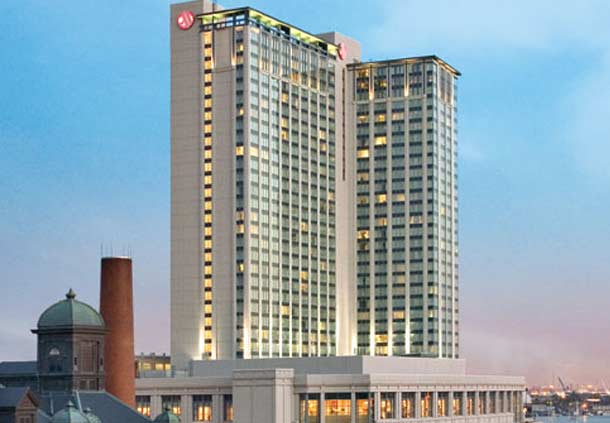News and notes from around the interweb:
- The government now scans faces of Americans as they leave the country at six airports. I’ve written that this is coming. And it’s creepy as hell.
- “The outer layer of Baltimore’s Marriott Waterfront Hotel is constructed of the same material that was used as the outer layer of a residential housing tower in London that burned in a tragic, deadly fire last month” (HT: Jeff M.)

- According to Skift Hyatt signed a deal with Booking.com to make up for volume they’ll lose while playing chicken with Expedia which drives about 20% of US hotel reservations.

Expedia Doing the Commission Dance… Flickr: Juggernautco - 10 Chinese Megacities to See “Polluted and crowded. Also distinct and completely fascinating. And then there’s the food.”
- I’m not the only one who thinks Open Skies agreements are a good thing (in addition to being the clear policy of the U.S. pursuing its own interest for decades)
- I’m going to admit I’m pretty pleased with this (so it can’t count as a humble brag). The Economist’s Gulliver covered the request for protectionist trade policies by United, Delta, and American because of subsidies provided to Emirates, Etihad, and Qatar and offered me as the counterpoint.
The travel and aviation blogger Gary Leff has consistently made the opposite case, arguing that America’s airlines are so deeply subsidised by, and intertwined with, the government that their complaint is hypocritical, and that “the push for government action against Etihad, Emirates, and Qatar is pure self-interest at the expense of US consumers.


Biometric scans plus banning online check-in for flights to the US will bring the current transatlantic fares down from $350 in late summer to $250. Why is that? BECAUSE NOBODY WANTS TO PUT UP WITH SUCH S*** ON VACATION. It’s mind-bumblingly insane. And all those currently half-empty aircraft underscore the existing insanity. Sure, go ahead and add a few more layers of numbskull bureaucracy. See what that does for the travel industry in USA…
Related to the Bloomberg article. I agree that these second cities in China are great if you speak some putonghua. But the real place to visit is the small cities within these megacity districts. I live in Chengdu and have lived in Chongqing. Both are good places to start but the smaller towns of Zigong (famous for frogs, rabbits, spicy pork aorta and brains), Yibin (strong fresh red pepper dishes and the best made Liang Gao dessert) in Sichuan, for instance, are famous for some of the best and spiciest food and have little pollution. Same goes for smaller cities in Chongqing province. The new high speed rail between Xian and Chengdu is almost complete and should open up some of the northern Sichuan cities as well, although many are known more for military engineering and business than food.
“Within the Sichuan region, the cuisines of Chengdu and Chongqing are distinctly recognizable. For instance, you cannot easily find good Sichuan Chili Chicken in the former, and the latter uses more garlic for the hot pot sauce.”
Not really. Many foreigners go to Chongqing and think they’re eating at a Chongqing restaurant and it’s actually food in the style of another provincial town. Chongqing is really famous for it’s small noodles, dirty hole in the wall beef tallow hot pot and crawfish. The noodles can certainly be found in Chengdu but it’s not going to be the same thick and amazing bowl of pork and pea noodles that you will get at one of the iconic places in CQ. Good insanely mala La Zi Ji (the chicken he refers to) can be found pretty easily, even in Beijing, it’s just more common to find restaurants that specialize in it in Chongqing. Hot Pot did sort of split into two factions in the past decades as some Chengdu hot pot establishments drifted to become less spicy to accommodate the tastes outsiders who settled there from East China. But traditional very spicy hot pot is still the norm throughout the rest of sichuan cities and is coming back into popularity in Chengdu. Chengdu is a good place to find almost any food from west china and the quality can be excellent (including Tibetan) but the hotels generally give horrible advice to tourists. The places that Anthony Bourdain and the famous tourist spots that hotels send people too are not places I would waste my time at, maybe Tian Tian but that’s not even all that great. The Tian Shui Mian place that all the tourists go near Wenshu Monastery is so bad it’s not even worth a trip compared to the insanely good stuff you can find in local secret favorites in Northern Chengdu.